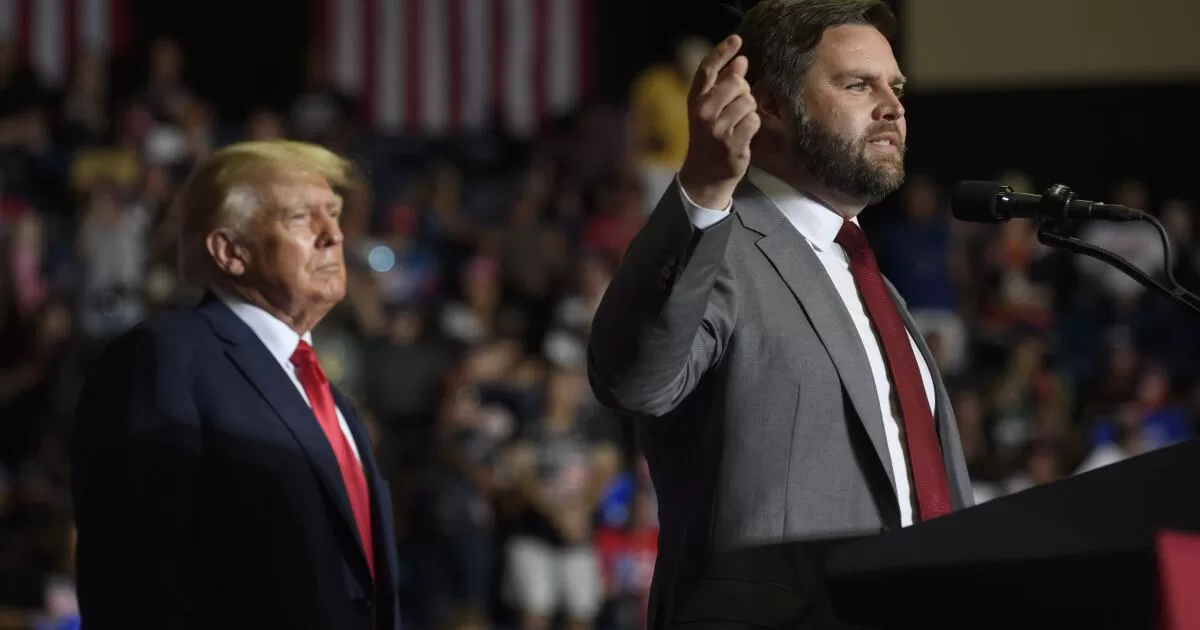J.D. Vance, the Ohio senator and author of the acclaimed memoir “Hillbilly Elegy,” will be the Republican vice presidential nominee, former President Trump announced Monday.
“As Vice President, J.D. will continue to fight for our Constitution, stand with our Troops, and will do everything he can to help me MAKE AMERICA GREAT AGAIN,” Trump said in a post on Truth Social.
Though he had once positioned himself to Republicans as an alternative to Trump — once famously likening Trump to “cultural heroin” — in time Vance became one of the former president’s most fervent supporters and defenders.
Trump’s decision defied speculation early in the campaign that the former president would choose a person of color or a woman to broaden his political base. Instead, Trump-Vance creates the kind of team found throughout American history: two men, both white, though Trump, at 78, is twice the age of the 39-year-old Vance.
Vance, whose full name is James David Vance, will turn 40 in August. Like his wife, Usha Chilukuri Vance, he has a law degree from Yale, where the two met. They have three children.
For weeks, Trump had reportedly been courting Vance, along with Florida Sen. Marco Rubio and North Dakota Gov. Doug Burgum, as potential vice presidential picks — drawing out the suspenseful announcement and creating comparisons to a casting call, from his time as head honcho of the reality TV show “The Apprentice.”
Vance attained international renown for his 2016 bestselling memoir “Hillbilly Elegy: A Memoir of a Family and Culture in Crisis,” which details Vance’s childhood in Middletown, Ohio, a steel mill town in America’s heartland.
Vance described his mother, who became pregnant as a teenager, as someone struggling with addiction, mental health issues and unstable relationships. Vance went to live with his grandmother — a hard-working woman he affectionately calls Mamaw, from Kentucky.
“Hillbilly Elegy” reads as a love letter to Vance’s family — their struggles with addiction, disruptive relationships and tight-knit love. But perhaps more so, it is an epistle on the state of working-class white people — the same demographic that Trump counts as the bedrock of his base.
Vance was not always in Trump’s camp.
In an interview in 2016, the year Trump first ran for president, he said, “I’m not a Trump supporter, but I even feel a certain attachment, and I get a little bit cheery when he says certain things on the campaign trail, when he criticizes the elites in such strong language — it’s a little refreshing, even if you disagree with the substance of the remarks.”
That same year, in a piece for the Atlantic, he wrote, “Trump is cultural heroin. He makes some feel better for a bit. But he cannot fix what ails them, and one day they’ll realize it.”
That view changed. “I actually think Trump is a much better model of statesman, which is he’s tough, he’s funny, he sometimes says things unfiltered,” Vance said in an interview last month. “But when it comes to actual decision making, he’s much more careful and cautious than any person currently representing the country.”
Vance, already an outspoken critic of Democrats and President Biden, became even more so recently. This week he even blamed Democrats for the attempted assassination of Trump, even as the shooter’s motives remain unknown.
“Today is not just some isolated incident,” he posted on the social media platform X. “The central premise of the Biden campaign is that President Donald Trump is an authoritarian fascist who must be stopped at all costs. That rhetoric led directly to President Trump’s attempted assassination.”
Vance served in the Marine Corps in Iraq before attending Ohio State University and Yale Law School. He then moved to San Francisco and worked as an investor for the Silicon Valley venture capital firm Mithril Capital, becoming a protégé of Peter Thiel, once a Republican megadonor who gave $10 million to Vance’s Senate campaign. Thiel previously donated to Trump, but told the Atlantic that he would not give to any politicians in the 2024 election.
“Hillbilly Elegy,” which was later made into a Netflix film, launched Vance into international stardom. He penned think pieces and reportedly harbored presidential aspirations with close advisors.
In a 2017 essay in the New York Times, Vance wrote about identifying parts of himself in former Presidents Clinton and Obama, who also grew up in underprivileged environments, largely raised by their grandparents. Of Obama, he wrote, “It is one of the great failures of recent political history that the Republican Party was too often unable to disconnect legitimate political disagreements from the fact that the president himself is an admirable man.”
Vance perhaps would repeat the same sentiment toward his new boss, whom he spilled copious amounts of ink warning America about during the 2016 election.
“During this election season, it appears that many Americans have reached for a new pain reliever. It too, promises a quick escape from life’s cares, an easy solution to the mounting social problems of U.S. communities and culture,” Vance wrote in the piece for the Atlantic. “It enters minds, not through lungs or veins, but through eyes and ears, and its name is Donald Trump.”
Yet six years later, Trump singled Vance out of a competitive race for Ohio Senate, endorsing him in the 2022 midterm elections. Vance soared to the front of the pack and won against seasoned Democrat Tim Ryan.
A few months into his first Senate term, Vance dealt with a crisis in his district — a train derailed in East Palestine. But as his term wore on, Vance turned his attention to more election-worthy national issues: immigration, China and Trump’s criminal trials.
Soon, Vance rose to the top of Trump’s vice presidential short list.
